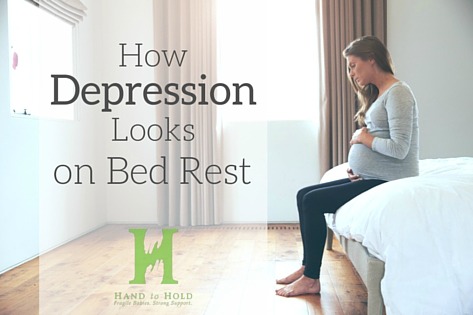Over 50% of women on bed rest show signs of depression, research shows.
Lack of physical activity, identity loss, lack of control and social isolation are some of the reasons why women struggle with low mood. Added on to all of these risk factors is the biggest risk factor for developing depression: high levels of stress, something women on bed rest experience every second of every day.

Depression doesn’t have to mean clinical depression.
In fact, many women on bed rest may not have a clinical mood disorder but rather a subclinical variety of major depression called dysthymia. This is when depressed mood occurs more often for most days without ever having a full depressive episode.
No matter the type or severity of the depression, a depressive mood can present in several different ways varying from person to person and depending on the situation.
Here are the top 5 faces of depression I see most often with the moms on bed rest who I work with:
“I don’t want to do anything.”
You’re bored and you want to kill some time but there are no options that sound appealing to you. Your favorite shows don’t make you laugh, your mystery book is no longer suspenseful. Even hilarious Vine videos of tiny animals eating tiny food don’t stir up much inside.
Everything feels “blah.”
“I can’t sleep!”
This is beyond the pregnancy insomnia that most women carrying a baby face. You just can’t get your mind to shut off at night. Alternatively, at night you’re wide awake, your mind is blank but you just can’t fall asleep.
You try everything from face massages to meditations to aromatherapy but nothing makes you relax, close your eyes and drift off into dreamland.
“I can’t do this.”
Overwhelming feelings are very real for moms on bed rest. Whether anyone actually says it to you or not, you’ve taken it upon yourself to feel completely responsible for the life of your little baby.
However, when you’re faced with emotional overload in a situation that you feel is completely out of your control, it’s easy to blame yourself and your abilities.
You may find yourself thinking thoughts such as, “I’m broken,” or “I’m not strong enough for this.” You may look to the future and how many more days, weeks and months you hope to have on bed rest and feel completely defeated and doubt whether you can get through this.

“This is my fault.”
You may spend several hours a day agonizing over the past, wondering what you did to cause your pregnancy complications or how you’re to blame for how bed rest is impacting your family.
For example, you think about how if you had taken the other, more practical, job you may have had better benefits than the job you did take which was better fit for your career aspirations. Then you wouldn’t be in the financial state you’re in now that you’re not working.
Or you remember all of the times you pushed off starting a family and wonder if you started a little too late and if that’s why you’re on bed rest.
Any time it gets quiet thoughts like these come back from the quiet corners of your mind and you just spin in circles as you blame yourself for the situation you and your baby are in.
“I hate this!”
You’re angry and everything sets you off. When Netflix takes a little longer to load, your husband is home 10 minutes later than he said he would be or you drop your spoon on the ground and you aren’t allowed to bend over and pick it up.
You’re irritated and you pick fights with your partner or your mom all the time. You know you’re being unreasonable. You even wonder if this is the pregnancy hormones making you do this. But you just can’t stop.
Everyone experiences some version of all of these faces of depression throughout our lives. Just because you have a difficult few days here and there doesn’t mean you are depressed.
However, if you find yourself showing any of these faces of depression (or a combination of a couple of them) more often than that, it’s best to seek the support of a professional who specializes in supporting women on bed rest to help guide you through the ups and downs of your high-risk pregnancy.
Depression during pregnancy has been linked to preterm birth and low fetal birth weight so reaching out for support isn’t just good for you but is also good for your baby.
